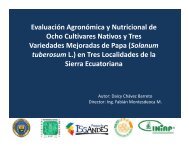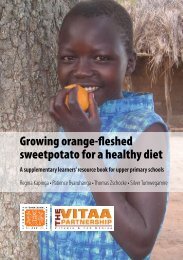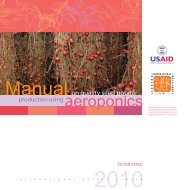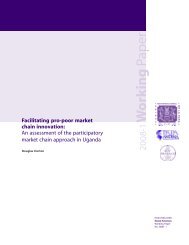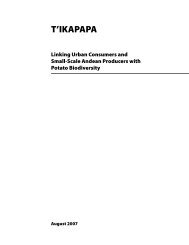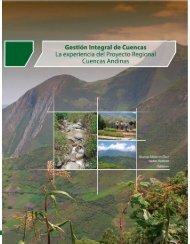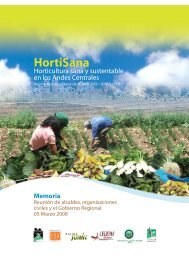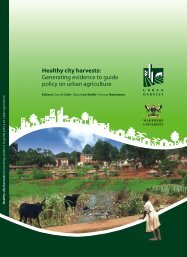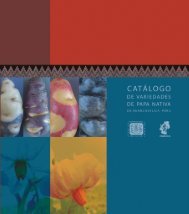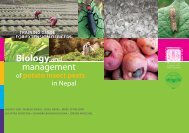Impacts of Urban Agriculture Annual Report.p65 - International ...
Impacts of Urban Agriculture Annual Report.p65 - International ...
Impacts of Urban Agriculture Annual Report.p65 - International ...
- No tags were found...
Create successful ePaper yourself
Turn your PDF publications into a flip-book with our unique Google optimized e-Paper software.
NetworkingLocal and global networkingFrom its base in Lima, Peru, <strong>Urban</strong> Harvest’s research anddevelopment program engages with partners andstakeholders in local and regional settings in Asia, Africaand Latin America through multi-sectoral platforms at citylevel, through regional networks <strong>of</strong> cities and throughregionally focused international organizations andpartnerships. <strong>Urban</strong> Harvest also participates in globalinitiatives and alliances to facilitate cross-learning amongdeveloping regions and between North and South.At the local level <strong>Urban</strong> Harvest’s stakeholder andpolicy dialogue platform (SPDP), described from theresearch point <strong>of</strong> view in previous sections, als<strong>of</strong>acilitates communication, information sharing andlearning among and by local stakeholders in “anchorcities” – urban and peri-urban locations wherediagnostic studies, technical interventions and policyanalysis and development are undertaken with partners.The high level <strong>of</strong> complexity <strong>of</strong> urban ecosystems andthe great diversity <strong>of</strong> stakeholders and their needs putsan especially high premium on this communication andsharing and the formation <strong>of</strong> alliances. The involvement<strong>of</strong> municipal authorities in these local platformsisparticularly important, both to tap into their expertisein planning and policy, as well as to provide learningopportunities to them about integration <strong>of</strong> agriculturein urban governance.Local level networking also provides a means for formalcapacity development opportunities involving linkswith local universities and training organizations.At the regional level, through networking with regionalorganizations and linking agencies in anchor cities and“contact” cities – urban and peri-urban areas involvedin training and knowledge exchange creating learningpartnerships and build capacity. Thematic andknowledge sharing workshops have been co-organizedwith regional partners (for example, UN-HABITAT andthe RUAF Foundation in Sub-Saharan Africa and REDAGUILAR in Latin America) that have brought togetherpolitical and technical representatives from differentcities in each region. Cross-visits have also beenorganized between anchor cities and between anchorand contact cities, for example the sharing <strong>of</strong> gendermainstreamingexperiences in Kenya with Ugandanpartners, or the exposure <strong>of</strong> researchers and localgovernment <strong>of</strong>ficials in Western Kenya to policyprocesses in Nairobi and Nakuru.In Africa, with funding from IDRC, <strong>Urban</strong> Harvest linkedup in 2003 and 2004 with several CGIAR Centers (CIP,ILRI, IWMI, World Agr<strong>of</strong>orestry Center), internationallyand regionally based organizations (RUAF Foundation,Municipal Development Program, Mazengira Institute)and national partners to implement a regional trainingcourse for multi-disciplinary and multi-sectoral teamsfrom seven cities from East, Southern and CentralAfrica. After the course, these city teams later formeda virtual network as they sought to implementproposals and utilize methods developed andpresented as part <strong>of</strong> the course. As a way <strong>of</strong> drawingout the lessons and learning objectives <strong>of</strong> the realworld course for more general use, the materials <strong>of</strong> thecourse were later developed into a distance learningtool in the form <strong>of</strong> an interactive CD-ROM.In Latin America, <strong>Urban</strong> Harvest has been involved intraining and interaction among other CGIAR centersabout the use <strong>of</strong> Geographical Information Systems(GIS), especially with regard to its application to issues<strong>of</strong> water quality monitoring and land use changes. In aneffort to build a region-wide platform on urbanagriculture technology and policy support severalnetworks have sought to harmonize their activities, and<strong>Urban</strong> Harvest has multiple representation on Advisorycommittees <strong>of</strong> these initiatives.43



